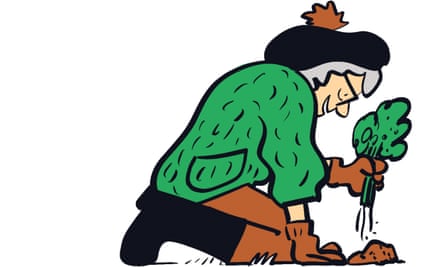Spring budget 2021: what it means for people on a range of incomes
Single, no children
Unemployed
 View image in fullscreen
View image in fullscreen
2020-2021 They receive jobseeker’s allowance of £74.35 a week (£58.90 if aged 16-24). Housing benefit eligibility will depend on the size of the property they rent and where they live.
2021-2022 As part of an overall increase to benefits of 0.5%, their jobseeker’s allowance has gone up to £74.70. Overall, they are just £18.20 a year better off.
Single, no children
Normally earns £34,000 but furloughed since March 2020 on 80% pay
 View image in fullscreen
View image in fullscreen
2020-2021 They pay £2,938 in income tax a year and £2,124 in national insurance. After both are deducted, they receive a net income of £22,138 a year, or £1,845 a month.
2021-2022 The personal allowance – the point at which they pay income tax – rises fractionally to £12,570, and the national insurance threshold is up too, meaning they are£22 better off this tax year. If their furlough ends in July and they resumee work on full pay, they will be £3,490 better off than last year.
Single, one child
Earns £14,000, with benefits top-up
 View image in fullscreen
View image in fullscreen
2020-2021 After tax and NI are deducted their take-home pay is worth £13,162 a year. However, the family also receives tax credits worth £4,642, plus child benefit of £1,095, giving a total family income of £18,899.
2021-2022 Post-tax salary is now worth a bit more, £13,184, while tax credits and child benefit rise by £63.35 to £5,800. They will receive the chancellor’s one-off £500 extra tax credit payment making them £585.51 a year better off.
Single, one child
Income of £48,000 but furloughed
 View image in fullscreen
View image in fullscreen
2020-2021 They were furloughed (on 80% of pay up to a maximum of £2,500 a month – £39,000 gross pay) for the second half of the tax year meaning they paid £5,298 in income tax and £3,540 NI, while child benefit is worth £1,095 a year. The family has a net annual income of £31,256.
2021-2022 If they are furloughed for the first three months of the tax year, and then restored to full pay, their post-tax income goes up to £33,244. This, plus the child benefit increase of 10p a week, means the family will be £3,087 a year better off.
Single, no children
Income £110,000
 View image in fullscreen
View image in fullscreen
2020-2021 This high flyer pays £33,496 in income tax and £6,060 in NI, giving them a net annual income of £70,444.
2021-2022 They will pay £1.31 a week less in income tax but their NI bill will increase by £0.36 a week. This leaves them £49.16 a year better off – enough for a round of drinks at the golf club.
Unmarried couple, both aged 45-55
First income of £55,000, second income of £31,000
 View image in fullscreen
View image in fullscreen
2020-2021 They pay combined annual income tax of £13,195 and NI of £7,540, leaving an actual joint net income of £65,265.
2021-2022 They both pay lower tax although their combined NI bill is slightly higher. Their combined deductions fall to £20,663. Overall, their combined actual income is £71 more than last year.
Unmarried couple, two children, one of whom is disabled
One income of £22,000
 View image in fullscreen
View image in fullscreen
2020-2021 They pay a combined income tax/NI bill of £3,398 a year. They also receive tax credit of £7,611, child benefit of £1,828, and disability payments of £2,454. This gives a combined net income of £30,487.
2021-2022 Their income tax and NI liability fractionally falls, while their benefits rise by £113 a year. They also receive the one-off £500 tax credit payment, which results in them being £635 a year better off – the biggest non furlough increase.
Unmarried couple, no children
First income of £52,000, second income of £18,000
 View image in fullscreen Illustration: Mark Long/The Guardian
View image in fullscreen Illustration: Mark Long/The Guardian
2020-2021 This dinky (double income, no kids yet) couple pays a combined annual income tax bill of £9,395 and NI of £5,920 – leaving them with a disposable income of £54,685 a year.
2021-2022 Once the changes are applied, their income tax bill drops slightly to £9,312, while they will pay a combined total of £5,931 in NI. This leaves them with £54,757 to spend – £71 more than last year for a romantic meal out – hopefully soon.
Unmarried couple, two children
One income of £90,000
 View image in fullscreen Illustration: Mark Long/The Guardian
View image in fullscreen Illustration: Mark Long/The Guardian
2020-2021 The high earner pays a total of £29,156 in tax and NI. They are not entitled to keep their child benefit because they have one income over £60,000, giving a net annual income of £60,844.
2021-2022 The tax and NI changes mean they will pay combined tax and NI of £29,107, leaving them £49 a year better off – about the same cost as a family visit to the zoo.
Married couple, two children
Both unemployed
 View image in fullscreen
View image in fullscreen
2020-2021 They receive universal credit worth £256.41 a week plus child benefit of £35 a week, giving a total of £15,153 a year, not including any rent. They have greatly benefited from the extra £20 a week UC uprating announced in 2020.
2021-2022 Their UC goes up to £257.58 but only for the first six months of the year. From October it will go down to £237.58 once the extra £20 a week is removed. Child benefit rises by £1.32 a week. Overall they are worse off by £451.36 a year – by far the biggest losers financially.
Married couple, two children
One income of £55,000

2020-2021 They pay a combined income tax and NI bill of £14,456. They are also entitled to child benefit of £547.30 a year – half of what they would receive if their income were below £50,000. They receive a net annual income of £41,091.
2021-2022 The tax and NI changes mean they will see combined tax/NI deductions of £14,407. Child benefit rises a little, leaving them £51.76 a year better off.
Married couple, employed, four children
One income of £29,000 (full marriage allowance transferred)
 View image in fullscreen
View image in fullscreen
2020-2021 Because they earn less than £50,000 a year, they keep all of their child benefit worth £3,271 a year, plus child tax credit of £6,990. Once tax and NI are deducted (£5,388) they receive a total net income of £33,872.
2021-2022 Their benefits package is now worth an extra £115 a year. They pay £24.16 less tax and NI. The big boost comes with the one-off £500 tax credit payment. Overall, the family has £639 more to spend on trips to the pool this year.
Married couple, one child
First income of £95,000, second income of £70,000
 View image in fullscreen
View image in fullscreen
2020-2021 Our high-earning couple pay £52,013 a year in combined income tax and NI, leaving them with a joint net annual income of £112,987. No child benefit is due because they earn above the £60,000 threshold.
2021-2022 Income tax is £40,857 and NI is £11,058. The changes to the thresholds mean their tax and NI bill goes down £98 leaving them with an annual net income £98 a year higher.
Married couple, one child
One income of £34,000 (full marriage allowance transferred)
 View image in fullscreen
View image in fullscreen
2020-2021 The main earner pays a combined income tax and NI bill of £6,988. The couple receive full child benefit of £21.05 a week, giving a net annual income of £28,106.
2021-2022 The NI changes mean they will pay combined tax and NI of £6,964. Child benefit is also up a tiny amount, leaving them a little (£29) a year better off.
Married pensioners, both in their 70s
State pension
 View image in fullscreen
View image in fullscreen
2020-2021 Their joint state pension allowance and pension credit now stands at £265.20 a week, or £13,790 a year.
2021-2022 The pre-announced rise to pension credit means that our couple receives– £5.10 a week more – an increase of £265.20 a year.
Single pensioner
Basic state pension plus private pension of £12,000
 View image in fullscreen
View image in fullscreen
2020-2021 Their state pension is worth £134.25 a week, or £6,981 a year. They pay £1,044 tax on their private pension – no NI is payable – giving them a net income of £17,935 a year.
2021-2022 The uprating of pensions leaves them looking at a combined net income of £347.92 a week, an increase of £2.99. Overall, they are £155.36 a year better off.
Well-off pensioner couple
State pension plus private pension of £60,000
 View image in fullscreen
View image in fullscreen
2020-2021 The state pension is worth £268.40 a week. Their private pension is worth £48,504 a year after tax. It gives them an overall net income of £59,673 a year.
2021-2022 From April this couple’s state pension rises to £275.20 and after tax, the pension is worth £48,572. Overall, they are £347 to the good – the big pensioner winners.
Single pensioner
New state pension plus a private pension of £8,000
 View image in fullscreen
View image in fullscreen
2020-2021 Their state pension is worth £175.20 a week. Overall, their net income is £16,440 a year after they have paid income tax on their private pension.
2021-2022 Their state pension entitlement goes up to £179.60 a week. Overall, their net income rises to £16,639, leaving them a shade under £200 a year better off than in the previous year.
All figures supplied by Dan Rust of Turquoise Training. Tax rates in Scotland will vary.




